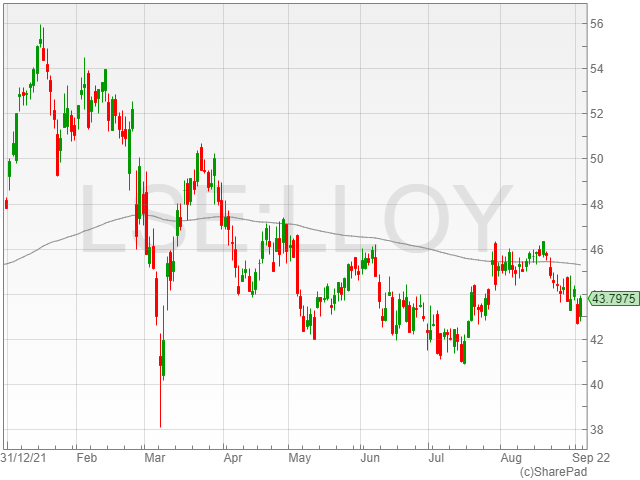Lloyds shares are facing the doubled edged sword of higher rates as the benefits of a higher net interest margin are becoming increasingly threatened by any slow down in the Uk housing market.
The ECB has recently hiked rates and the odds are pretty high the Bank of England will follow suit and continue to increase rates at their next meeting.
Looking at the way inflation is progressing (13% according to the Bank of England, as high as 18% if you’re following Citibank’s expectations), aggressive rate hikes are likely to continue in the term and cause shifts in consumer and investor behaviour.
So, how are Lloyds’ shares holding up at the moment?
Lloyds shares
Lloyds has a very generous dividend yield of 4.7%, placing it above the other FTSE 100 bankers such as Barclays, with a 3.7% yield, HSBC at 3.6% and Standard Chartered at 1.8%.
Although, Lloyds is actually matched by NatWest, also boasting a 4.7% yield.
However, Lloyds has the advantage over NatWest in its dividend cover, with an encouraging 3.9 times cover against NatWest’s cover of 2.3, giving Lloyds the advantage in a volatile market environment.
Lloyds’ shares have a current PE ratio of 6 and a forward PE ratio of 6.3, indicating an approaching fall in earnings, so investors should be aware of that factor as the bank faces difficult economic circumstances in the coming year.
Lloyds’ share price has fallen 8.2% year-to-date, marking a potential opportunity to buy the stock at a dip. However, it’s worth noting that its competitors might be heading towards greener pastures than the blue chip bank.
Barclays has a PE ratio of 3.9 and a forward PE ratio of 5.1, indicating a drop in earnings. Yet the rest of the FTSE 100 banks are tapped for higher earnings going forward, with HSBC displaying a PE ratio of 8.6 to a forward PE ratio of 7.4, NatWest from 9.5 to 6.5 and Standard Chartered from 9 to 6.8.



Housing market slowdown
Lloyds is the largest mortgage lender in the UK, which spelled bad news for the bank on the latest housing market report from Nationwide this week.
Nationwide noted a house price growth to 10% in August compared to 11% in July, and while the figure remained in the double-digits, it did mark signs of a slowdown in the market as the cost of living crisis crunch reached the industry.
Surveyors noted a drop in new buyer enquiries in recent months, and the level of mortgage approvals fell below pre-Covid numbers, kicking a potential dent in Lloyds’ mortgage business.
“We expect the market to slow further as pressure on household budgets intensifies in the coming quarters, with inflation set remain in double digits into next year,” said Nationwide chief economist Robert Gardner.
Nationwide also noted the double-edged sword of rising interest rates on the housing market, as while higher rates means higher interest on loans, it also means a bucket of cold water thrown over the red-hot property demand as prospective home buyers throw their dream of a house on the back-burner for another time.
“Moreover, the Bank of England is widely expected to continue raising interest rates, which will also exert a cooling impact on the market if this feeds through to mortgage rates, which have already increased noticeably in recent months,” said Gardner.
Conclusion
Lloyds is not in trouble, and it will take a great deal to knock the bank into straits sufficiently troublesome to warrant panic.
Indeed, Lloyds’ shares are fairly well valued at 6x earnings and 0.6 Price-to-NAV.





